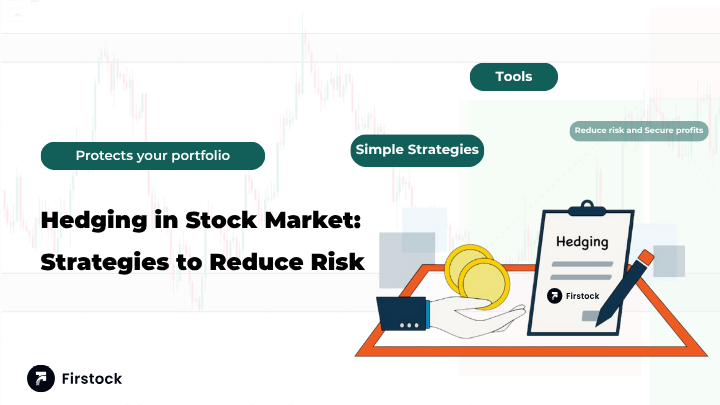Hedging in Stock Market: Top 4 Strategies to Reduce Risk

Hedging in Stock Market Explained for Beginners – Ultimate Guide with Firstock App
Ever wondered what seasoned traders do during volatile markets? They hedge. In simple terms, hedging in the stock market is like taking an insurance policy for your investments. Even if storms hit, your portfolio stays protected. Sounds smart, right?
In this guide, we’ll decode hedging in plain language, step-by-step—with real examples, easy analogies, and modern tools like the Firstock option trading app that make hedging simpler than ever. Let’s dive in.
What is Hedging in Stock Market?
Hedging in stock market is a risk management strategy where investors use other assets (like options or futures) to reduce potential losses. It's not about making extra money—it’s about protecting what you already own.
Hedging Meaning in Stock Market (Simple Definition)
In one sentence: Hedging is like buying an insurance policy on your stock or investment. You pay a small fee (like option premium) to avoid bigger losses when markets crash.
Why Do Traders and Investors Hedge?
Because the stock market is unpredictable. Even good stocks fall sometimes. Hedging helps:
- Protect your profits
- Reduce emotional stress
- Plan better during volatility
- Invest confidently over the long term
So if you’ve ever worried about sudden drops, hedging gives peace of mind.
What Kind of Risks Does Hedging Protect Against?
- Market Risk: When the entire market drops
- Sector Risk: If only your stock’s industry gets hit
- Currency Risk: Especially if you hold international stocks
- Interest Rate Risk: When rate decisions impact financial markets
With proper hedging, you don’t need to fear every news headline.
How Does Hedging Work? (Basic Explanation)
Here’s a simple analogy: If you own a house, you insure it. The insurance doesn't stop a fire, but it covers damages.
Similarly in stocks: if you own a share, you buy an option as protection. If the stock falls, the option goes up—limiting your losses.
Types of Hedging Strategies in the Stock Market
a. Options Hedging
Popular strategy used to hedge against price movements. Tools used: Put options, call options, or spreads.
b. Futures Contracts
Help hedge against index or commodity price moves.
c. Short Selling
An advanced technique, but risky for beginners.
d. Diversification
Classic approach: invest in different assets across industries and geographies.
Hedge in Trading Using Options
Options are the most common type of hedge in trading. They’re affordable and flexible. A put option is particularly useful—it gives you the right to sell your stock at a predetermined price even if the market crashes.
Using Put Options as Hedge (Example)
You own 100 shares of a company at ₹1,000 per share. You worry the price may fall. So you buy a ₹950 put option. If stock crashes to ₹800, the put protects your losses beyond ₹950. That’s hedging smart.
Using Futures to Hedge Your Portfolio
If you're holding multiple stocks in a sector or index, futures can be used to hedge. For example, if you own bank stocks, you can sell Bank Nifty futures.
Stop-Loss vs Hedging – What’s Better?
A stop loss sells your stock automatically at a certain price. Good for day traders.
Hedging, however, lets you hold the stock long-term while protecting downside risk.
For investors, hedging is usually smarter.
Hedging Through Diversification
Want a simple hedge? Spread your investments. If tech stocks fall, maybe your investment in FMCG, pharma, or gold will balance the losses.
Technology in Hedging – Tools & Apps You Can Use
Today, even beginners can hedge using smart trading apps. Look for features like:
- Options strategy builder
- Option chain analysis
- Live market data
- Hedge calculators
- Alerts and insights
Why Choose Firstock for Hedging?
The Firstock app for options trading india is designed to help retail traders hedge like pros. Here's why it stands out:
- Simple UI with advanced options trading features
- Built-in strategy tools and risk analysis
- Live data & platform stability
- Perfect for hedging effectively and easily
- Great for both day traders and long-term investors
When you’re using an app like Firstock, you don’t need to be a market expert. The app guides you.
How to Hedge Using the Firstock Option Trading App
Here’s a beginner-friendly process:
- Download Firstock and create your account
- Choose the stock or index you want to hedge
- Open the options chain and analyze put/call premiums
- Use tools like strategy builder or profit-loss calculator
- Place your hedging trade—simple, fast, and secure
- Monitor your hedge using real-time data and alerts
Whether you're hedging your portfolio for one day or one month—Firstock has the tools you need.
Is Hedging Worth It? Pros, Cons & Myths
Advantages:
- Reduces risk of loss
- Improves portfolio stability
- Helps during market uncertainty
Challenges:
- Costs money (option premiums)
- Needs understanding
- May reduce profits slightly
Myth: Hedging is only for experts.
Truth: With the right tools (like Firstock), anyone can hedge.
Who Should Be Hedging Today?
- Swing traders
- Long-term investors
- High-net-worth individuals
- Anyone with large stock holdings
- Anyone who wants stress-free investing
In short? If you don’t like losing sleep over market crashes—you should hedge.
Final Thoughts
Being a novice or an experienced investor, understanding what is hedging in stock market is a survival and success tool in investment business. Hedging is your secret weapon, so you should think of it as a shield in market madness.
Hedging has been made easier, quicker and available to all with intelligent applications such as Firstock. Therefore, do not wait until the next market crash, but begin to investigate the concept of hedging.
Hedge wisely. Invest confidently.
FAQs
1. What is hedging in stock market?
Hedging is a technique to reduce or offset the risk of price movements in your investments using tools like options or futures.
2. Why do investors use hedging strategies?
Investors hedge to protect profits, reduce risk, and stay invested even in volatile markets.
3. How does an option trading app like Firstock help with hedging?
Firstock - stock trading app makes hedging simple with tools like strategy builders, live market data, option chains, and user-friendly hedging calculators.
4. Do I need a lot of money to hedge?
Not necessarily. Even small investors can hedge using options for a modest cost.
5. Is hedging risky?
Hedging minimizes risk. However, like any investment strategy, you need to understand how it works and use it properly.





